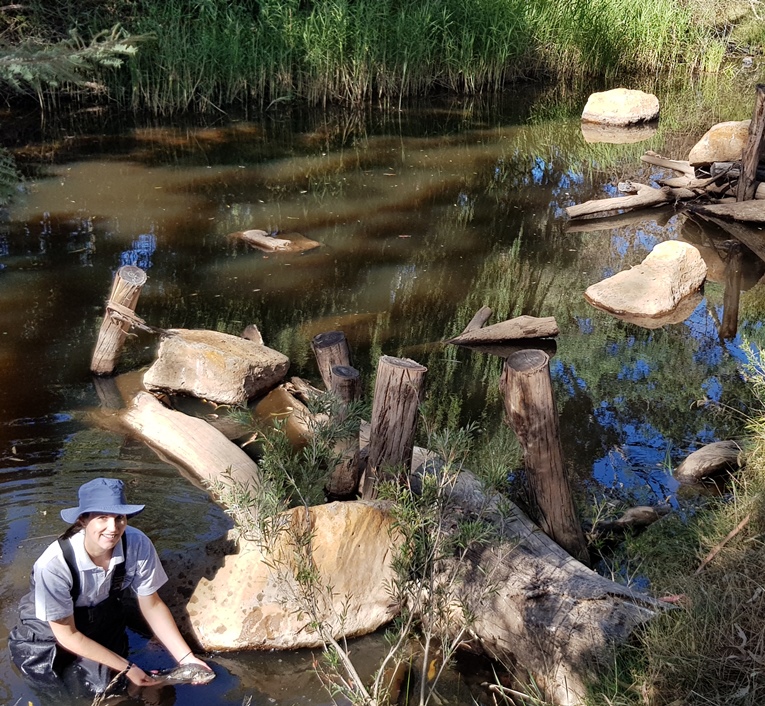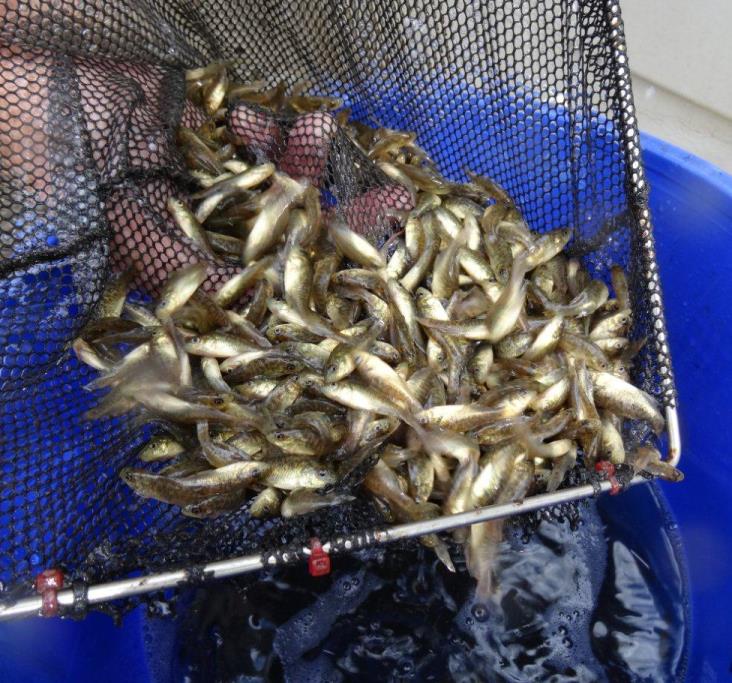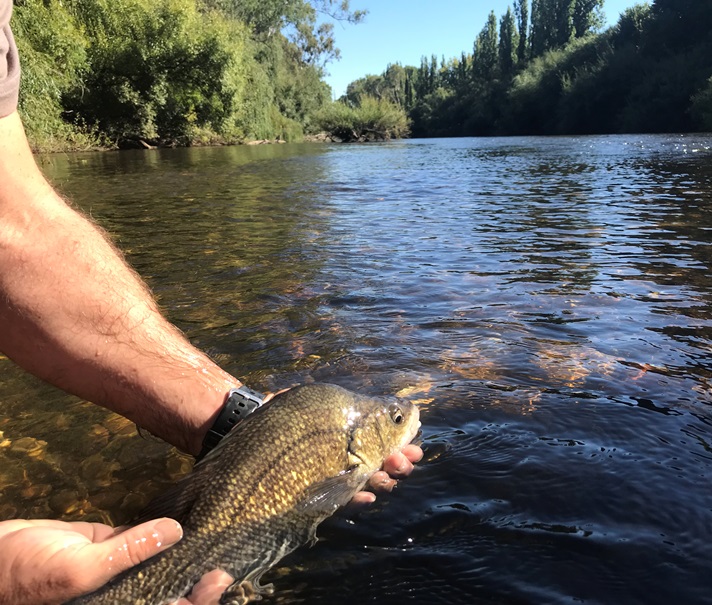Macquarie Perch, found in the cooler middle-upper reaches of the Murray-Darling Basin, has undergone a long-term decline. Now absent from much of its former range, it is nationally endangered. In Victoria, there are fragmented populations in the Mitta Mitta, Ovens, Goulburn and Broken river catchments, and a translocated population in the Yarra River. ARI has been involved in research and monitoring projects for many years, to improve our understanding of the species’ status, its habitat requirements, and response to environmental conditions. This work has directly helped to improve management and contribute to the species’ recovery.
- Tonkin, Z., Sharley, J., Fanson, B., Raymond, S., Ayres, R., Lyon, J., Blacombe, S. and Bond, N. (2019) Climate variability regulates population dynamics of a threatened freshwater fish. Endangered Species Research 40: 257-270
The topics below outline relevant research and monitoring activities, and include key publications.
For more information contact: zeb.tonkin@delwp.vic.gov.au
Population monitoring
Since 2006 regular monitoring of important Macquarie Perch populations across Victoria occurs. These include the Yarra River, tributaries of the Goulburn Broken catchment (including Hollands Creek), Buffalo River and Lake Dartmouth. The information collected enables scientists and managers to track the population status of this species as well as inform specific management actions, including the delivery of water for the environment, instream and riparian habitat restoration and fishing regulations. Survey data from Hughes Creek after habitat improvement works are very encouraging with a high proportion of Macquarie Perch using restored habitat. The monitoring has also helped build relationships with local communities who support the species’ recovery.

For more information on Macquarie Perch within the Goulburn Broken catchment, see the Goulburn Broken Catchment Management Area website, and ARI’s Victorian Demonstration Reach Program web page.
- Hunt, T.L., Douglas, J.W., Allen, M.S., Gwinn, D.C., Tonkin, Z., Lyon, J. and Pickworth, A. (2011) Evaluation of population decline and fishing sustainability of the endangered Australian freshwater fish Macquaria australasica. Fisheries Management and Ecology 18(6): 513-520
Breeding
ARI has used specific research projects to improve knowledge on spawning and recruitment ecology of Macquarie Perch. An assessment of spawning behaviour and habitat use in the Mitta Mitta River inflow of Lake Dartmouth found aggregations of fish occurred at specific locations just upstream of shallow, fast-flowing areas with a gravel or pebble substrate. Similarly, an assessment of egg distributions of two river populations (King Parrot Creek and Yarra River) also suggested localised patterns of spawning, with egg density highly variable between sites, and strongly associated with water temperature (greatest egg abundance occurred at >18ºC).
The growth, recruitment, and abundance of Macquarie Perch was enhanced during refilling of Lake Dartmouth. This suggests extended periods of low lake levels followed by rapid inundation events are likely to enhance recruitment and population growth opportunities.
An assessment of recruitment of five populations of Macquarie Perch found a broad correlation between regional-scale flow variation and localised recruitment events. There was poorer recruitment in years with a higher river discharge during the core egg and larval period in November-December. Most remaining populations occur in isolated, small tributary streams with highly variable flows, which increases the risk of poor recruitment periods, particularly under climate change predictions.
- Tonkin, Z., Kearns, J., Lyon, J., Balcombe, S.R., King, A.J. and Bond, N.R. (2017) Regional-scale extremes in river discharge and localised spawning stock abundance influence recruitment dynamics of a threatened freshwater fish. Ecohydrology 10(6): e1842
- Tonkin, Z., Lyon, J., Ramsey, D.S.L., Bond, N.R., Hackett, G., Krusic-Golub, K., Ingram, B.A. and Balcombe, S.R. (2014) Reservoir refilling enhances growth and recruitment of an endangered remnant riverine fish. Canadian Journal of Fisheries and Aquatic Sciences 71(12): 1888-1899
- Tonkin, Z., Kearns, J., O’Mahony, J. and Mahoney, J. (2015) Spatio-temporal spawning patterns of two riverine populations of the threatened Macquarie perch (Macquaria australasica). Marine and Freshwater Research 67: 1762-1770
- Tonkin, Z., Lyon, J. and Pickworth, A. (2010) Spawning behaviour of the endangered Macquarie Perch Macquaria australasica in an upland Australian River. Ecological Management and Restoration 11(3): 223-226
Population Modelling
A population model was developed for Macquarie Perch to explore scenarios for translocation and provide insights into the age class, quantity of fish and timeframes likely required for successful establishment of new populations. This provides an example of how conservation models can help in threatened species recovery.
- Todd, C.R. and Lintermans, M. (2015) Who do you move? A stochastic population model to guide translocation strategies for an endangered freshwater fish in south-eastern Australia. Ecological Modelling 311: 63-72
Genetics
Most remaining populations of Macquarie Perch have a low genetic diversity and population sizes are below what is needed to retain adaptive potential. Regular small-scale translocations between populations and increasing connectivity between populations has been recommended to improve gene flow.
- Pavlova ,A., Beheregaray, L.B., Coleman, R., Gilligan, D., Harrisson, K.A., Ingram, B.A., Kearns, J., Lamb, A.M., Lintermans, M., Lyon, J., Nguyen, T.T.T., Sasaki, M., Tonkin. Z., Yen, J.D.L. and Sunnucks, P. (2017) Severe consequences of habitat fragmentation on genetic diversity of an endangered Australian freshwater fish: a call for assisted gene flow. Evolutionary Applications 10(6): 531-550
- Lutz, M., Tonkin, Z., Yen, J., Johnson, G., Ingram, B., Sharley, J., Lyon, J., Chapple, .D., Sunnucks, P. and Pavlova, A. (2021). Using multiple sources during reintroduction of a locally extinct population benefits survival and reproduction of an endangered freshwater fish. Evolutionary Applications 14(4): 950-964
Re-establishing Macquarie Perch in the Ovens River
Macquarie Perch had declined in the Ovens River until it was considered locally extinct. A five-year stocking program began in 2013/2014 using fingerlings produced by Victorian Fisheries Authority and translocations of sub-adult fish from Lake Dartmouth. There has also been extensive rehabilitation of streamside and instream habitats, and strong involvement with the local community. Monitoring indicates both hatchery fish and translocated fish have survived, dispersed beyond the release locations and are growing at similar rates to other populations. There is also strong evidence that these released fish are now breeding naturally, which is contributing to the re-establishment of a self-sustaining population in the Ovens River, which is a Demonstration Reach .

Page last updated: 29/01/25
